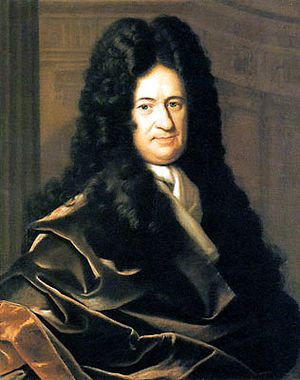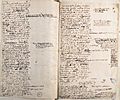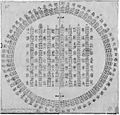Gottfried Leibniz facts for kids
Quick facts for kids
Gottfried Wilhelm Leibniz
|
|
|---|---|
 |
|
| Born | 1 July 1646 Leipzig, Electorate of Saxony
|
| Died | 14 November 1716 (aged 70) |
| Era | 17th-century philosophy |
| Region | Western Philosophy |
| Doctoral advisor | Erhard Weigel |
| Doctoral students | Jacob Bernoulli Christian von Wolff |
|
Main interests
|
Metaphysics, Mathematics, Theodicy |
|
Notable ideas
|
Infinitesimal calculus, Monadology, Theodicy, Optimism Leibniz formula for pi Leibniz harmonic triangle Leibniz formula for determinants Leibniz integral rule Principle of sufficient reason Diagrammatic reasoning Notation for differentiation Proof of Fermat's little theorem Kinetic energy Entscheidungsproblem |
|
Influences
|
|
|
Influenced
|
|
| Signature | |
 |
|
Gottfried Wilhelm Leibniz (born July 1, 1646 – died November 14, 1716) was a brilliant German thinker. He wrote most of his works in French and Latin.
Leibniz was very important in both philosophy and mathematics. He is famous for inventing calculus, a type of advanced math. He developed it at the same time as Isaac Newton, but they worked separately. Leibniz's way of writing calculus is still used today. He also invented the binary system, which uses only 0s and 1s. This system is the basis for all modern computers.
Contents
Who Was Leibniz?
Gottfried Leibniz was born in Leipzig, Germany. He was a very smart kid who taught himself Latin at a young age. He went to the University of Leipzig when he was only 14.
He studied law and philosophy. He earned his doctorate in law when he was just 20 years old. Leibniz was not just a scholar; he also worked for important German noble families.
A Life of Learning and Work
Leibniz served as a secretary and advisor. One of the families he worked for later became the British royal family. This shows he was involved in important European politics and diplomacy. He traveled a lot and met many famous people of his time.
Leibniz was known for his incredible knowledge. He studied almost every subject. People sometimes call him the last "universal genius." This means he knew a lot about many different fields.
Leibniz's Big Ideas
Leibniz had many groundbreaking ideas. His work influenced thinkers for centuries. He tried to connect different areas of knowledge.
Calculus and Binary System
Leibniz is perhaps most famous for his work in calculus. This math helps us understand how things change. His system of writing calculus, called Leibniz Notation, is still the standard.
He also created the binary system. This system uses only two symbols, 0 and 1. It's the language that computers use to process information. Without it, modern computers wouldn't exist!
Philosophy and Optimism
In philosophy, Leibniz is well-known for his idea of optimism. He believed that our universe is the best possible one God could have made. He thought that even though there is bad in the world, it's part of a greater good.
He was one of the great thinkers of the 17th century, along with René Descartes and Baruch Spinoza. These thinkers were called rationalists. They believed that reason and logic were the main ways to gain knowledge.
Leibniz's philosophy also looked back to older ideas, like those from the Scholastic tradition. But it also looked forward to modern logic and analysis.
Other Contributions
Leibniz made contributions to many other fields. These included physics and technology. He even had ideas that were similar to later discoveries in biology, medicine, geology, and psychology.
He wrote about politics, law, ethics, theology, and history. He even wrote some poetry! His writings are found in many journals, letters, and unpublished notes. Because of this, it's hard to find a complete collection of all his work.
Images for kids
-
Leibniz's correspondence, papers and notes from 1669 to 1704, National Library of Poland.
-
A diagram of I Ching hexagrams sent to Leibniz from Joachim Bouvet. Leibniz added the numbers.
-
Commercium philosophicum et mathematicum (1745), a collection of letters between Leibniz and Johann Bernoulli.
Related pages
Error: no page names specified (help). In Spanish: Gottfried Leibniz para niños
 | Aurelia Browder |
 | Nannie Helen Burroughs |
 | Michelle Alexander |







